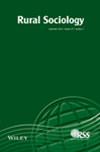消除刻板印象:村庄是西班牙年轻人聚会的理想场所
IF 1.9
3区 社会学
Q2 SOCIOLOGY
引用次数: 2
摘要
大多数关于农村青年的研究都集中在导致他们迁移到城市的物质条件上,但却没有倾向于处理社会文化方面的问题,例如那些与休闲有关的问题以及可能制约年轻人迁移过程的因素。本研究的目的是对比年轻人关于休闲的话语和表征与他们在西班牙村庄进行的节日习俗。实地调查包括13个讨论组和38个深度访谈(N = 118),参与者年龄在15至24岁之间。研究结果表明:(1)青年聚会观念的建构是通过显性的、二元的、不平等的城乡表征来实现的,体现了传统的乡村刻板印象的存在;(2)在一年中的特定时间,如当地的节日,这个村庄成为一个令人向往的聚会场所;(3)农村青年的实践对这种规范性想象提出了质疑,这也表现在他们在休闲的构建和管理中的适应性、归属感和能动性。摆脱对乡村的刻板印象,创造对乡村休闲可能性的积极思考,可以引导年轻人将其视为机会和个人发展的空间。本文章由计算机程序翻译,如有差异,请以英文原文为准。
Eliminating Stereotypes: Villages as Desirable Spaces for Partying among Spanish Youth☆
Most of the research on rural youth has focused on the material conditions that cause their migration to cities, but it has not tended to address sociocultural dimensions, such as those concerning leisure and what might condition the processes of migration among young people. The aim of this study is to contrast the discourse and representations that young people have regarding leisure with the festive practices that they carry out in Spanish villages. The fieldwork consisted of 13 discussion groups and 38 in-depth interviews (N = 118), with participants aged between 15 and 24 years. The results show that: (1) young people construct their idea of partying through dominant, dichotomous and unequal rural–urban representations, demonstrating the presence of traditional stereotypes around rurality; (2) the village becomes desirable as a place for partying at specific times of the year, such as local festivals; (3) the practices of rural youth call into question this normative imaginary, as is also shown by their adaptation, belonging and agency in the construction and management of leisure. Getting rid of stereotypes about rurality and creating positive thinking about the leisure possibilities in villages can lead young people to see it as a space for opportunities and personal development.
求助全文
通过发布文献求助,成功后即可免费获取论文全文。
去求助
来源期刊

RURAL SOCIOLOGY
SOCIOLOGY-
CiteScore
4.60
自引率
13.00%
发文量
47
期刊介绍:
A forum for cutting-edge research, Rural Sociology explores sociological and interdisciplinary approaches to emerging social issues and new approaches to recurring social issues affecting rural people and places. The journal is particularly interested in advancing sociological theory and welcomes the use of a wide range of social science methodologies. Manuscripts that use a sociological perspective to address the effects of local and global systems on rural people and places, rural community revitalization, rural demographic changes, rural poverty, natural resource allocations, the environment, food and agricultural systems, and related topics from all regions of the world are welcome. Rural Sociology also accepts papers that significantly advance the measurement of key sociological concepts or provide well-documented critical analysis of one or more theories as these measures and analyses are related to rural sociology.
 求助内容:
求助内容: 应助结果提醒方式:
应助结果提醒方式:


